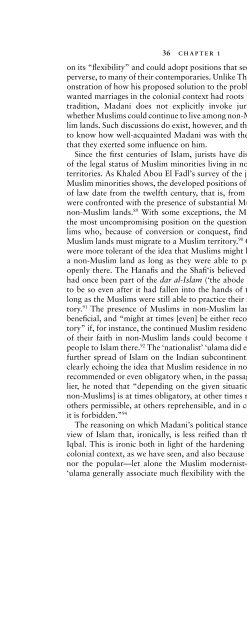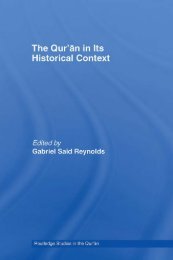Download (1 MB) - Islam and Christian-Muslim Relations: Articles ...
Download (1 MB) - Islam and Christian-Muslim Relations: Articles ...
Download (1 MB) - Islam and Christian-Muslim Relations: Articles ...
You also want an ePaper? Increase the reach of your titles
YUMPU automatically turns print PDFs into web optimized ePapers that Google loves.
36 CHAPTER 1on its “flexibility” <strong>and</strong> could adopt positions that seemed shocking, evenperverse, to many of their contemporaries. Unlike Thanawi’s careful demonstrationof how his proposed solution to the problem of dissolvingunwantedmarriages in the colonial context had roots in the medieval legaltradition, Madani does not explicitly invoke juristic discussions onwhether <strong>Muslim</strong>s could continue to live amongnon-<strong>Muslim</strong>s in non-<strong>Muslim</strong>l<strong>and</strong>s. Such discussions do exist, however, <strong>and</strong> though it is impossibleto know how well-acquainted Madani was with them, it is not unlikelythat they exerted some influence on him.Since the first centuries of <strong>Islam</strong>, jurists have discussed the questionof the legal status of <strong>Muslim</strong> minorities living in non-<strong>Islam</strong>ic states <strong>and</strong>territories. As Khaled Abou El Fadl’s survey of the juristic discourses on<strong>Muslim</strong> minorities shows, the developed positions of the different schoolsof law date from the twelfth century, that is, from the time that juristswere confronted with the presence of substantial <strong>Muslim</strong> populations innon-<strong>Muslim</strong> l<strong>and</strong>s. 89 With some exceptions, the Maliki jurists adoptedthe most uncompromisingposition on the question, insistingthat <strong>Muslim</strong>swho, because of conversion or conquest, find themselves in non-<strong>Muslim</strong> l<strong>and</strong>s must migrate to a <strong>Muslim</strong> territory. 90 Other schools of lawwere more tolerant of the idea that <strong>Muslim</strong>s might legitimately reside ina non-<strong>Muslim</strong> l<strong>and</strong> as longas they were able to practice their religionopenly there. The Hanafis <strong>and</strong> the Shafi‘is believed that a territory thathad once been part of the dar al-<strong>Islam</strong> (‘the abode of <strong>Islam</strong>’) continuedto be so even after it had fallen into the h<strong>and</strong>s of the non-<strong>Muslim</strong>s, aslongas the <strong>Muslim</strong>s were still able to practice their religion in that territory.91 The presence of <strong>Muslim</strong>s in non-<strong>Muslim</strong> l<strong>and</strong>s might in fact bebeneficial, <strong>and</strong> “might at times [even] be either recommended or obligatory”if, for instance, the continued <strong>Muslim</strong> residence <strong>and</strong> public practiceof their faith in non-<strong>Muslim</strong> l<strong>and</strong>s could become the means of callingpeople to <strong>Islam</strong> there. 92 The ‘nationalist’ ‘ulama did entertain hopes of thefurther spread of <strong>Islam</strong> on the Indian subcontinent. 93 And Madani wasclearly echoingthe idea that <strong>Muslim</strong> residence in non-<strong>Muslim</strong> l<strong>and</strong>s wasrecommended or even obligatory when, in the passage quoted in full earlier,he noted that “dependingon the given situation, [interaction withnon-<strong>Muslim</strong>s] is at times obligatory, at other times recommended, at yetothers permissible, at others reprehensible, <strong>and</strong> in certain circumstancesit is forbidden.” 94The reasoningon which Madani’s political stance was based reveals aview of <strong>Islam</strong> that, ironically, is less reified than that of the modernistIqbal. This is ironic both in light of the hardening of the shari‘a in thecolonial context, as we have seen, <strong>and</strong> also because neither the scholarlynor the popular—let alone the <strong>Muslim</strong> modernist—perceptions of the‘ulama generally associate much flexibility with the ‘ulama’s view of the



